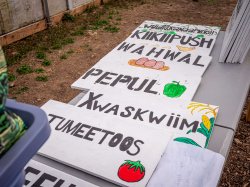Language Revitalization Project Highlighted in INSIGHT into Diversity Magazine
Posted in: Homepage News and Events, Native American and indigenous Studies

The latest issue of INSIGHT into Diversity highlights the efforts of institutions and researchers, including Montclair’s Native American and Indigenous Studies (NAIS) program, that are collaborating to maintain, revitalize, and celebrate Indigenous languages.
NAIS students and faculty have been working with the Turtle Clan of the Ramapough Lenape Nation on projects encompassing both environmental justice and language revitalization.
“In order to do the work of decolonizing and promoting well-being of Indigenous people and Indigenous communities in our region, we needed to follow the lead of the work that they have already been doing,” says Maisa Taha, associate professor of anthropology and faculty contributor to NAIS.
Montclair scholars began by helping to fight for the proper cleanup of Turtle Clan members’ land, which has been damaged by industrial dumping. They are organizing records of the devastation.
Part of the NAIS program also involves language reclamation work. Students assist with community-based projects led by Nikole Pecore, a Munsee language expert and tribal member of the Stockbridge-Munsee Nation in Wisconsin who has worked on revitalization efforts across the country.
“I think there can be a sort of public misconception, a very deep and troubling misconception, that a) Indigenous people no longer exist among us non-Indigenous folks, and b) … if they do, … their languages and cultures are so small or antiquated that they no longer hold any relevance for our lives today,” Taha says.
The loss of languages is one of the most pressing crises of our time, Taha says.
“As these languages are being threatened so deeply, we’re losing ways of understanding the world, of understanding our connection to the environment, of interacting, [and relating],” Taha says.
Read the full INSIGHT into Diversity story
Read more about NAIS:
Community-Based Learning Makes an Impact
Students Plant Seeds to Revive a Native American Language
